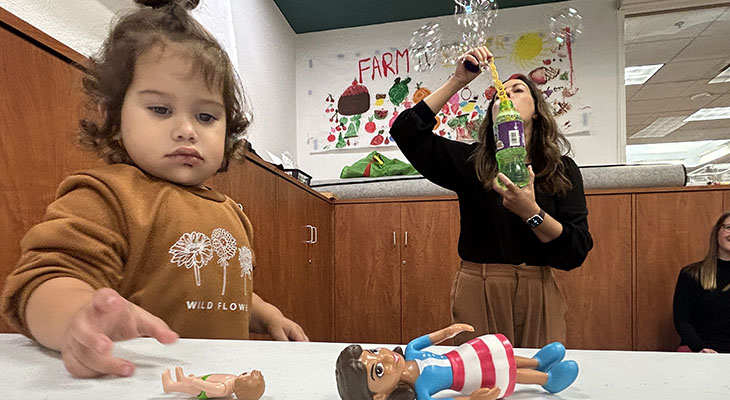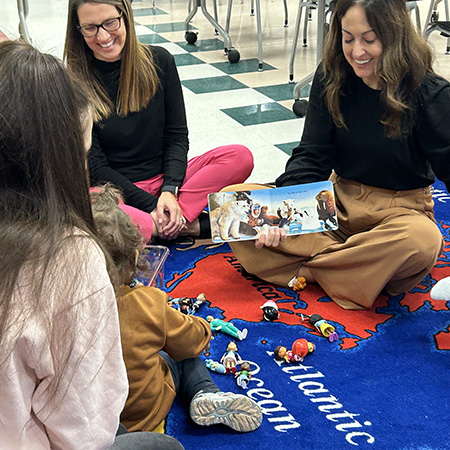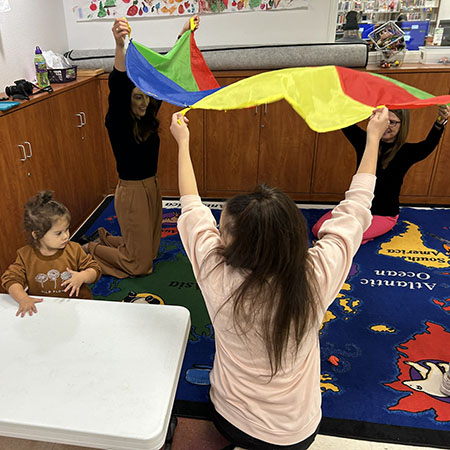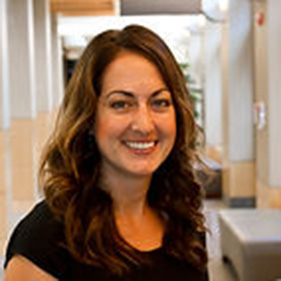It's been a challenge for Sacramento-area mom Kristyn Traynor to find activities and playgroups where her 3-year-old daughter, Bloom, is comfortable. The toddler was diagnosed with autism last year and is non-speaking.
"It's hard because they don't always let the kids be themselves," Traynor explained. She said some activities were more structured, or certain behavior was expected, which wasn't always a good fit for Bloom.
Then she learned about a free, new playgroup at a Sacramento Public Library branch specially designed for young children who are autistic or have other neurodevelopmental or physical disabilities. The group is run by UC Davis MIND Institute staff who are experts in early childhood development.
Bloom has thrived in the playgroup.
"Here, the kids can jump, they can run, they can do what they want, and she just loves it. Other kids are doing the same things as her. She doesn't look different. She doesn't look like she's not supposed to be doing something. She just feels really included," Traynor said.
The project is funded by a grant from First 5 Sacramento. The groups are offered in English as well as in Spanish due to a partnership with La Familia Counseling Center.

A safe space to create connections
On a recent morning, Kristyn and Bloom joined a small group of children and moms at the North Highlands-Antelope library. Two clinical psychologists from the MIND Institute led the children in a song and read a short story. The children played with figurines in a small tub of water, danced under a colorful parachute and clapped their hands, trying to catch bubbles.
"We're trying to create a safe space where kids can fully be themselves, whatever that looks like," said Melissa Mello, a licensed psychologist at the MIND Institute, who is leading the three-year project.
The playgroups were created after conversations with families who noted a lack of opportunities like this for neurodiverse children, Mello said.
"It's really special that we developed these through family voices. This is a space where everyone is welcome. Your child is safe here and can learn to play here. It's something that isn't easy to find in the community right now, so we're excited to be filling this need."

The partnership with Sacramento Public Library is key to reaching the community.
Each playgroup meets for an hour, twice a week for eight weeks. Every few months, the group changes library locations. Staring Jan. 21, the playgroup will gather at the Franklin Community Library location in Elk Grove.
"We know that working with the MIND Institute to bring inclusive playgroups to library spaces will expand our reach and increase access to library resources for historically underserved communities within Sacramento County," said Nate Haslan, an early learning specialist with the library system.
We're trying to create a safe space where kids can fully be themselves, whatever that looks like. -Melissa Mello, licensed psychologist, UC Davis MIND Institute
Preparing kids for school, sharing resources
The playgroups are free. They're for children ages 0 to 5 with exceptional needs — which can include neurodevelopmental, physical or other disabilities or chronic illness.
In addition to providing social connection and interaction, Mello offers an evidence-based framework that centers on play.
"We're trying to provide a little bit of readiness for pre-K or kindergarten," she explained. We rotate between sensory activities like the water or bubbles or a ball pit, to things that that give us a chance to practice play skills, taking turns and imitation."

There's been another type of connection happening organically, too — between the parents.
"The parents are great," Traynor said. "They get what I'm going through. Everyone else has been recently diagnosed too, so meeting up with other people who get it has been really nice."
Traynor said the moms have swapped tips on therapies and shared resources. She's also now connected on social media with a mom she met through the group.
"It's just been great, having a community for Bloom."
When Bloom first came to the playgroup, she stood in one corner, and was anxious about joining in. She even tried to leave. Traynor said because she was given the time to get comfortable, she was able to settle in.
"She loves it now and looks forward to it every week. Even though she's nonverbal, you can tell she's excited when she's walking through the door."







